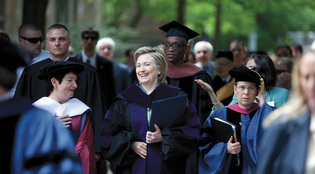 loading
loading
CommencementHonorary degrees and teaching prizes Mark OstowHonorary degree recipients Hillary Clinton ’73JD (right), the secretary of state; and Alison Richard, former Yale provost and current vice chancellor of Cambridge; walk in the commencement procession. View full imageRecipients of Honorary Degrees Richard Serra ’62BFA, ’64MFA, a sculptor whose work, "massive in scale, intimate in involvement, and delicate in balance," uses "materials, time, and space to make art that challenges, disorients, and surprises": Doctor of Fine Arts. William Drayton ’70LLB, founder of Ashoka: Innovators for the Public, who has "help[ed] people around the world help themselves" to advance "economic development, environmental sustainability, public health, and human rights": Doctor of Humane Letters. John McPhee, a "versatile, adventurous, and incorrigibly curious" writer of "luminous prose," a "one-man liberal education" who has "shaped the genre of literary journalism": Doctor of Letters. Gustavo Gutierrez, a Dominican priest, writer, professor, and "the father of liberation theology" who has "challenged the conscience of all faithful men and women" by calling for "an end to the injustice of poverty": Doctor of Divinity. Alison Richard, an anthropologist and Yale's longest-serving provost, who, as the first woman to head the University of Cambridge, has "reshaped the role . . . to provide true leadership, . . . artfully melding innovation with tradition": Doctor of Humane Letters. Sofia Gubaidulina, a composer who "persevered through decades of state-imposed censorship, writing music that received no public hearing" in the Soviet Union -- work for which she is now celebrated "as a leading contemporary composer": Doctor of Music. Leroy Hood, immunologist and innovator, who has devised "new tools and techniques to sequence genes and proteins" and thus "accelerated the pace, increased the accuracy, and reduced the cost of biomedical research": Doctor of Medical Sciences. Thomas Schelling, Nobel Laureate in Economics, who has used game theory to illuminate "some of the most vexing problems of our times: nuclear proliferation, arms control, racial discrimination, terrorism, and climate change": Doctor of Social Science. Bill T. Jones, "one of the leading choreographers and most inspired dancers of our time," who "celebrates the human form in motion" and uses "its power to reveal truths both personal and communal": Doctor of Fine Arts. Hillary Rodham Clinton ’73JD, Secretary of State, who, throughout her career, has "called the nation's attention to things that matter: health care, education, and the rights of women and children": Doctor of Laws.
Steven B. Smith, the Alfred Cowles Professor of Government and professor of philosophy: the Lex Hixon ’63 Prize for Teaching Excellence in the Social Sciences. Michael Frame, professor (adjunct) of mathematics: the Dylan Hixon ’88 Prize for Teaching Excellence in the Sciences and Mathematics. Fred Strebeigh ’74, senior lecturer in the department of English and the School of Forestry and Environmental Studies: the Richard H. Brodhead ’68 Prize for Teaching Excellence by Non-Ladder Faculty. Mark S. Mooseker, the Ross Granville Harrison Professor of Molecular, Cellular, and Developmental Biology: the Harwood F. Byrnes/Richard B. Sewall Teaching Prize for Promoting Student Learning Across the Curriculum. Beverly F. Gage ’94, assistant professor of history: the Sarai Ribicoff ’79 Award for the Encouragement of Teaching in Yale College. Lillian Guerra, assistant professor of history: the Sidonie Miskimin Clauss Prize for Teaching Excellence in the Humanities.
The comment period has expired.
|
|